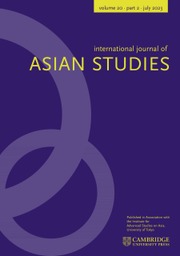Article contents
MANCHUKUO AND BEYOND: THE LIFE AND TIMES OF ZHANG MENGSHI
Review products
Published online by Cambridge University Press: 16 January 2017
Abstract
Zhang Mengshi died in late 2014 at the age of ninety-two, shortly after his autobiography was published. He was born into a life of privilege because his father Zhang Jinghui was a close confidant of the Chinese warlord Zhang Zuolin. Mengshi was a boy in Harbin in the 1930s when Russian influences dominated the city, then when his father became prime minister of the Japanese puppet state of Manchukuo in 1935 he lived with his family in Hsinking, the new capital. He studied in Japan in the early 1940s as war in the Pacific intensified. His father upheld the Japanese occupation of Manchuria, while Mengshi secretly worked with the Communist underground to undermine the occupation. When Soviet troops arrived in 1945 to take over from the defeated Japanese, Mengshi was also arrested and sent to Siberia, though he was willing to help the Russian Communists. In 1950 he returned to the new People's Republic of China, to work with the captured Chinese and Japanese from former Manchukuo, including his own father and former emperor Puyi, teaching them about the crimes they had committed. In this article Mengshi's fascinating autobiography is summarized and commented on.
- Type
- Review Article
- Information
- Copyright
- Copyright © Cambridge University Press 2017
References
REFERENCES
- 1
- Cited by




